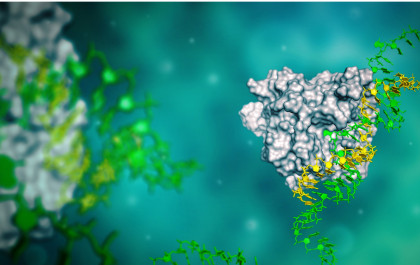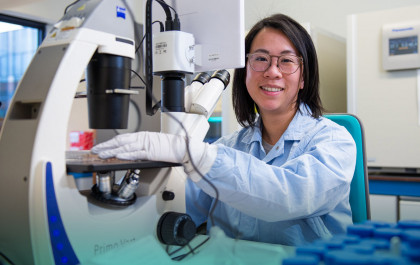ProQR Announces Year End 2023 Operating and Financial Results
- Preclinical and translational pipeline program data for AX-0810 for Cholestatic Diseases targeting NTCP and AX-1412 for Cardiovascular Disease targeting B4GALT1 anticipated in 2024, building further momentum toward the clinic
- Accelerated development of Axiomer™ for CNS applications via new research partnership with Rett Syndrome Research Trust
- Completed divestment of sepofarsen and ultevursen ophthalmic programs to Laboratoires Théa
- €118.9 million cash and cash equivalents as of December 31, 2023 providing runway into mid-2026
LEIDEN, Netherlands & CAMBRIDGE, Mass., March 13, 2024 (GLOBE NEWSWIRE) -- ProQR Therapeutics NV. (Nasdaq: PRQR) (ProQR), a company dedicated to changing lives through transformative RNA therapies based on its proprietary Axiomer™ RNA editing technology platform, today reported its financial and operating results for the year ended December 31, 2023, and provided a business update.
“Over the past year as we exclusively focused our strategy on RNA editing, ProQR made important progress with Axiomer, our ADAR-mediated RNA editing technology platform,” said Daniel A. de Boer, Chief Executive Officer of ProQR. “We announced our initial pipeline programs, AX-0810 and AX-1412, targeting NTCP and B4GALT1, respectively, and presented preclinical platform data across a variety of targets. Our platform has demonstrated robust editing, including reporting up to 70% editing of ACTB in the liver of non-human primates, as well as functional protein data with the liver target ANGPTL3 in mice. Additionally, we further strengthened our leading global IP estate for ADAR-mediated RNA editing, which was upheld when challenged by multiple parties in various jurisdictions. We continued to execute and build on the successes achieved during the first two years of our collaboration with Eli Lilly, and formed a new partnership with the Rett Syndrome Research Trust. We also completed the divestment of late-stage ophthalmic assets, sepofarsen and ultevursen, to Laboratoires Théa who will continue the development of these therapies for patients, as ProQR continues to focus exclusively on advancing our RNA editing platform and pipeline.”
De Boer continued, “In 2024, we anticipate sharing in vitro, in vivo, and translational data for our initial pipeline programs using Axiomer, and remain on track to enter the clinic in late 2024/early 2025. Along with our extensive body of preclinical proof of concept data for the platform, partnership with Eli Lilly, leading IP position, and strong cash position providing runway into mid-2026, we believe that ProQR is well positioned to continue to execute on our strategy and advance our mission of changing lives through transformative RNA therapies.”
Recent Progress
- In February, ProQR announced that it further strengthened its leading intellectual property estate for ADAR-mediated RNA editing by successfully defending against an opposition filed in Japan by a strawman against ProQR’s granted patent JP 7244922, which is related to the broad concept of using chemically modified oligonucleotides to target specific adenosines within target RNA using endogenous enzymes. The Japanese Patent Office rejected the strawman’s opposition and indicated that all claims were to be maintained as granted to ProQR.
- In January, ProQR highlighted its continued progress in advancing its Axiomer™ RNA editing technology platform, with new data presented at the 5th International Conference on Base Editing, Prime Editing & Related Enzymes (Deaminet 2024), including:
- Platform demonstrates robust in vivo editing capabilities reporting up to 70% editing of ACTB in the liver of non-human primates (NHPs) and mice; and
- Functional effect demonstrated in mice in vivo via modulation of ANGPLT3 protein properties leading to favorable increase in LPL enzymatic activity and meaningful impact of biomarkers.
- In January, ProQR and the Rett Syndrome Research Trust (RSRT) formed a partnership focused on utilizing ProQR’s Axiomer™ RNA editing technology platform to design and develop editing oligonucleotides targeting an underlying genetic variant that causes Rett syndrome. RSRT awarded ProQR approximately $1 million as a research grant for the initial phase of the project, which encompasses editing oligonucleotide design and optimization, including evaluation in in vivo models for editing efficiency and MECP2 protein recovery. It is the intent of the partnership to be continued by an expanded co-funding arrangement following the initial discovery work.
- In December, ProQR completed the divestment of sepofarsen and ultevursen to Laboratoires Théa, who will continue the development of these programs for patients with LCA10 and Usher syndrome. The transaction agreement provided ProQR with an initial payment of €8 million and the Company may be eligible for up to €165 million in further development, regulatory, and commercial earn-out payments upon related achieved milestones, as well as double-digit royalties based on commercial sales in the US and EU.
Anticipated Upcoming Events
- Additional Axiomer™ platform data updates throughout 2024.
- Preclinical and translational pipeline program data for AX-0810 for Cholestatic Diseases targeting NTCP and AX-1412 for Cardiovascular Disease targeting B4GALT1:
- In vitro and in vivo data for AX-0810 for Cholestatic Diseases targeting NTCP in mid 2024, and
- In vitro and in vivo data for AX-1412 for Cardiovascular Diseases targeting B4GALT1 in the second half of 2024.
- Continue to progress on key steps required to advance AX-0810 and AX-1412 to clinical trials with translational data updates ahead of entry to clinic, which is on track for late 2024/early 2025.
- Potential initial Trident preclinical data in late 2024 – Trident is ProQR’s early stage RNA editing pseudouridylation platform designed to enable the suppression of nonsense mutations and premature stop codons, which can edit a uridine (U) into a pseudouridine.
- Potential additional new pipeline target announcements in 2024.
- Continue to execute on partnership with Eli Lilly and Company (Lilly), with potential data updates to come in 2024 along with potential milestone income from existing partnership, and potential option to exercise for expansion of deal to 15 targets, which would result in a $50 million opt-in payment to ProQR.
- ProQR may selectively form new partnerships, which could include multi-target discovery alliances, or product alliances on specific programs.
Year End 2023 Financial Highlights
At December 31, 2023, ProQR held cash and cash equivalents of €118.9 million, compared to €94.8 million at December 31, 2022. Net cash generated by operating activities during the full year ended December 31, 2023 was €21.5 million, compared to €68.5 million net cash used in operating activities for the same period in 2022. The Company experienced a net positive cash flow from operating activities in 2023 primarily due to the receipt of the Lilly up-front payment of $60 million in February 2023.
Research and development costs for the year ended December 31, 2023 were €25.1 million, compared to €50.9 million for the same period in 2022. Research and development costs for the year end December 31, 2022 included costs related to the winding down of ophthalmology programs, including the clinical trials.
General and administrative costs for the year ended December 31, 2023 were €16.2 million, compared to €18.7 million for the same period in 2022.
Net loss for the year ended December 31, 2023 was €27.7 million or €0.35 per diluted share, compared to €64.2 million, or €0.90 per diluted share for the same period ended December 31, 2022. For further financial information for the period ended December 31, 2023, please refer to our 2023 Annual Report on Form 20-F and our Statutory Annual Report which will be available on our website, www. proqr.com under Financials and Filings.
About Axiomer™
ProQR is pioneering a next-generation RNA base editing technology called Axiomer™, which could potentially yield a new class of medicines for diverse types of diseases. Axiomer™ “Editing Oligonucleotides”, or EONs, mediate single nucleotide changes to RNA in a highly specific and targeted way using molecular machinery that is present in human cells called ADAR (Adenosine Deaminase Acting on RNA). Axiomer™ EONs are designed to recruit and direct endogenously expressed ADARs to change an Adenosine (A) to an Inosine (I) in the RNA – an Inosine is translated as a Guanosine (G) – correcting an RNA with a disease-causing mutation back to a normal (wild type) RNA, modulating protein expression, or altering a protein so that it will have a new function that helps prevent or treat disease.
About Biliary Atresia (BA) and Primary Sclerosing Cholangitis (PSC)
Cholestatic disorders refer to a group of diseases presenting excessive and toxic buildup of bile acids in the liver due to bile ducts dysfunction. This leads to liver damage and a range of debilitating symptoms. Without treatment, liver damage can progress through various stages, ultimately leading to liver failure and elevated risk of liver malignancy, affecting life expectancy. Cholestatic diseases remain leading causes of liver transplantation. There are no approved therapies for primary sclerosing cholangitis (PSC) for adults and biliary atresia (BA) for pediatrics It is estimated that 80,000 and 20,000 individuals have PSC and BA, respectively, in North America and in Europe.
About AX-0810 targeting NTCP
The majority of the bile acids present in the liver cells originate from the enterohepatic reuptake cycle. The key transporter responsible for hepatic uptake of bile acids from portal circulation is the sodium (Na+)-taurocholate cotransporting polypeptide (NTCP, SLC10A1 gene) expressed in the liver. AX-0810 is designed to introduce a loss of function variant in SLC10A1 RNA that has been found in human genetics to prevent re-uptake of bile acids in liver via NTCP. Based on its mechanism of action, AX-0810 has the potential to become a disease modifying treatment for PSC and BA primarily among other cholestatic diseases.
About Cardiovascular Diseases
Cardiovascular diseases (CVDs) are a group of health conditions that affect the heart and blood vessels, such as atherosclerosis which can lead to severe problems like heart attacks, heart failure, and stroke. CVDs represent the leading cause of disability and death in the world. Approximately 18 million people die every year from CVDs representing one third of all the global deaths. Despite available lipid lowering therapies and hypertension medications, the risk of CVDs is still projected to increase rapidly over the coming years.
About AX-1412 targeting B4GALT1
Gene–based analysis of rare beta-1,4-galactosyltransferase 1 (B4GALT1) missense variant (p.Asn352Ser) is known to lead to B4GALT1 protein loss of function and showed an association with decreased coronary artery disease. These beneficial effects are mediated by hypo-galactosylation of the apolipoprotein B100 and fibrinogen, known – independent – drivers of increased risk of CVDs. AX-1412 introduces a protective variant into B4GALT1 RNA to address the remaining residual risk of developing cardiovascular diseases. ProQR intends to advance AX-1412 targeting B4GALT1 to early clinical proof of concept stage, then would seek to partner this program.
About ProQR
ProQR Therapeutics is dedicated to changing lives through the creation of transformative RNA therapies. ProQR is pioneering a next-generation RNA technology called Axiomer™, which uses a cell’s own editing machinery called ADAR to make specific single nucleotide edits in RNA to reverse a mutation or modulate protein expression and could potentially yield a new class of medicines for both rare and prevalent diseases with unmet need. Based on our unique proprietary RNA repair platform technologies we are growing our pipeline with patients and loved ones in mind.
Learn more about ProQR at www.proqr.com.
Forward Looking Statements
This press release contains forward-looking statements. All statements other than statements of historical fact are forward-looking statements, which are often indicated by terms such as “continue,” "anticipate," "believe," "could," "estimate," "expect," "goal," "intend," "look forward to", "may," "plan," "potential," "predict," "project," "should," "will," "would" and similar expressions. Such forward-looking statements include, but are not limited to, statements regarding our business, preclinical model data, our initial pipeline targets and the upcoming strategic priorities and milestones related thereto, our Axiomer™ platform, including the continued development and advancement of our Axiomer platform, the therapeutic potential of our Axiomer RNA editing oligonucleotides and our ability to expand preclinical in vivo and in vitro data, the timing, progress and results of our preclinical studies and other development activities, including the release of data related thereto, our patent estate, including our anticipated strength and our continued investment in it, as well as the timing of our clinical development, the potential of our technologies and product candidates, the collaboration with Lilly and the intended benefits thereof, and our financial position and cash-runway. Forward-looking statements are based on management's beliefs and assumptions and on information available to management only as of the date of this press release. Our actual results could differ materially from those anticipated in these forward-looking statements for many reasons, including, without limitation, the risks, uncertainties and other factors in our filings made with the Securities and Exchange Commission, including certain sections of our annual report filed on Form 20-F. These risks and uncertainties include, among others, the cost, timing and results of preclinical studies and clinical trials and other development activities by us and our collaborative partners whose operations and activities may be slowed or halted shortage and pressure on supply and logistics on the global market; the likelihood of our preclinical and clinical programs being initiated and executed on timelines provided and reliance on our contract research organizations and predictability of timely enrollment of subjects and patients to advance our clinical trials and maintain their own operations; our reliance on contract manufacturers to supply materials for research and development and the risk of supply interruption from a contract manufacturer; the potential for future data to alter initial and preliminary results of early-stage clinical trials; the unpredictability of the duration and results of the regulatory review of applications or clearances that are necessary to initiate and continue to advance and progress our clinical programs; the ability to secure, maintain and realize the intended benefits of collaborations with partners, including the collaboration with Lilly; the possible impairment of, inability to obtain, and costs to obtain intellectual property rights; possible safety or efficacy concerns that could emerge as new data are generated in research and development; general business, operational, financial and accounting risks, and risks related to litigation and disputes with third parties; and risks related to macroeconomic conditions and market volatility resulting from global economic developments, geopolitical instability and conflicts. Given these risks, uncertainties and other factors, you should not place undue reliance on these forward-looking statements, and we assume no obligation to update these forward-looking statements, even if new information becomes available in the future, except as required by law.
ProQR Therapeutics N.V.
Investor contact:
Sarah Kiely
ProQR Therapeutics N.V.
T: +1 617 599 6228
skiely@proqr.com
or
Peter Kelleher
LifeSci Advisors
T: +1 617 430 7579
pkelleher@lifesciadvisors.com
Media contact:
Robert Stanislaro
FTI Consulting
T: +1 212 850 5657
robert.stanislaro@fticonsulting.com


